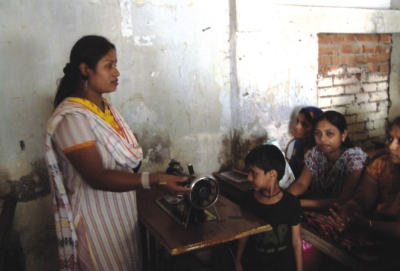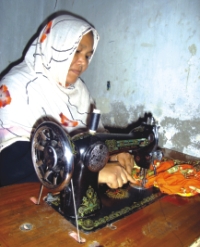|
Making a Difference
Smriti's Fight Goes On
Hana Shams Ahmed
Little Atia smiles at me with eyes full of wonder. “Khao,” she orders me and holds out a piece of shingara towards me. I gobble it up enthusiastically. Her curiosity about this stranger heightens and she grins again. Her young mother Mosammat Runa sits on a rickety bench nearby, smiling nervously about what her daughter would do next. Runa is one of 35 women, from the very poorest section of society, trying to learn a skill that would help them become financially independent. Their struggle, assisted by a brave fighter named Smriti Kona, is to make their lives marginally better in the face of various impediments.
Runa and others are learning their skills at a very modest NGO, Society to Uplift Social Harmony (SUSH), situated beyond Uttara sector 4. This area, known as Muktijoddha Road, is one of many stark contrasts that exist in the capital city. Just beyond the lavish, privately owned homes and burgeoning, glitzy shopping malls is a huge expanse of slums and tin-shed homes. To get to Muktijoddha Road one has to go through a winding broken road and cross a rail line that is open on one side. At least five rickshaw-pullers refused to take us to the location of the organisation. I am told that we were lucky. If it had rained, no rickshaw-puller would want to take us at all, and we would have to wade our way through knee-high muddy water to get to our destination.
The institution is modest. Housed in a single tin-shed, rented room it has about 10 long, worn out benches, a single sewing machine and walls that have seen better days. Women of all ages come here to learn how to sew children and women's clothes. After completing their three-month long training programme, they can either go to people's homes to take orders, or join a ready-made garments factory. Many of the women here have been abandoned by their husbands and families and some are widows. Many girls in the area have been unable to continue their education, because government-funded schools only provide free education till the fifth grade. All of these women are finding it impossible to make ends meet and have come to SUSH to equip themselves to earn a decent living.

Smriti Kona Biswas wants to help other women fight poverty and patriarchy.
The organisation was started by Smriti Kona Biswas, a 30-year-old woman. Smriti's own struggles in life made her realise that it was essential for a woman to be financially independent in our patriarchal and abusive society. Smriti was just another young girl studying for her HSC exams from Barisal Government Women's College. In a horrific case of mistaken identity, her name made headlines in all the major newspapers after a terrible incident on August 9, 1995.
On that day, Smriti had gone to Brojmohon University College to meet a friend to take study notes from her. She was waiting in the canteen for a long time when her unescorted presence was noted by a group of local hooligans. They discussed her amongst themselves and concluded that Smriti was in fact Mita -- a girl who was put on the gang's watch-list by her ex-boyfriend. After getting jilted he had asked the gang that if Mita ever set foot on the campus, they should destroy her life. They followed Smriti when she went out to speak to an acquaintance and dragged the two of them to a deserted building on campus. There the gang of nine brutally tortured and raped her and took nude photos of Smriti and her acquaintance. They were only saved from getting murdered when someone from a nearby building spotted them and informed the college authorities. Students and teachers rushed over from the college and caught the culprits red-handed.
After nine months of running to the court under unimaginable emotional stress, a verdict was finally

This woman wants to learn a skill so that she can become financially independent |
given in May 1996. Seven of the nine accused were given 10 years rigorous imprisonment, another was given seven years rigorous imprisonment and the last one, who did not rape her, got six months imprisonment.
But Smriti's troubles were far from over. She always felt under threat by the families of the perpetrators. Her father, Rohini Biswas, a primary school head teacher, decided that it would be best for her to leave the country and pursue her education abroad. “People always look at you differently and talk to you in a different way when they know you've been raped,” says Smriti. She got admitted into the Law Department of Pune University in India. Her father had saved up some money, but before she could begin her new life a new tragedy hit. Smriti's elder brother, a Dhaka University student, had a terrible motorcycle accident, for which seven lakh taka had to be spent on medical treatment. As if that wasn't bad enough, local party cadres grabbed four bighas of cultivable land belonging to Rohini Biswas, which used to bring in a substantial earning.
Losing all options, Smriti got admitted into the Department of Sanskrit at Dhaka University where she went on to complete her Bachelors and Masters. “It was only in Dhaka University that I finally got to blend in with the crowd and start relaxing again,” says Smriti, “I made a lot of very good friends there who helped me regain my self confidence.” While she was still a student Smriti started writing for newspapers -- contributing regularly to Bhorer Kagoj, Prothom Alo, Jai Jai Din, Janakantha and Banglabajar.
Finally Sriti Kona transitioned away from journalism and founded SUSH with the help of Kiriti Mitra. The training programme at SUSH is designed for divorced or abandoned women and those women who were otherwise rendered 'helpless' in society. On the day of my encounter with Runa's daughter, I was visiting SUSH to find out why it was in financial difficulty in spite of doing remarkable work.
Twenty-seven-year-old Nazma lives with her husband in Azampur together with her daughter. When she was just 13 years old, and a student of eighth grade her father could not continue her education any longer and married her off to a local trader at the kitchen market. Her husband never continued her education and she fell pregnant right after her marriage. Her 13-year-old daughter now studies in the eighth grade. "The money my husband earns is not enough to make ends meet," says Nazma, "and I don't have any education to get any work anywhere. I have nothing to do at home, so I thought if I learned how to sew clothes maybe I could earn some money staying at home."
Two batches of students, many with stories similar to Nazma, have already finished their courses. The aim of the programme was to give sewing machines to people who completed the programmes. "We got in touch with a lot of companies, including cell phone companies and companies that produce sewing machines locally, but we never received any response from any of them," says Smriti, “I just want to be able to help these women stand on their own two feet.” Although local businesses and multinationals are eager to talk about Corporate Social Responsibility, it seems Sriti Kona's organisation was not glamorous enough for them. Facing refusals from local corporations, SUSH has hit financial rock bottom. The NGO bureau also delayed their registration process, which made it difficult even for expatriate donors who wanted to help them. Since then, besides a few well wishers and members in the committee, no one has come forward to contribute to this worthy cause.
SUSH had rented a room for Tk 5000 in Azampur at first. There was a training programme in the daytime and a night-school programme for working children. "I tried to keep the night school going, but it was impossible," says Smriti. SUSH was involved in arranging a lead-screening programme for children where about 40 students of her night school were screened. Smriti had to move her organisation to a more moderate space. The rent for the room SUSH is housed in now costs Tk 2100. "But even this is difficult to maintain," she says, "there are just no more funds left."
Smriti works at BTV as a researcher for a programme called "Pakkhik Barta", a news programme in sign language for deaf viewers. Smriti's life changed forever on the day a group of hoodlums thought that rape was a weapon to silence a woman forever. They couldn't have been more wrong. She fought back and won, putting the culprits behind bars and set an example for other women. But she is still fighting, and the struggle is not over. Through SUSH she is trying to motivate other women to fight back against poverty and obscurantism and become confident and independent. It would be a tragedy if businesses could shower generosity in so many other places, but not in this direction.
Copyright (R) thedailystar.net 2008 |
